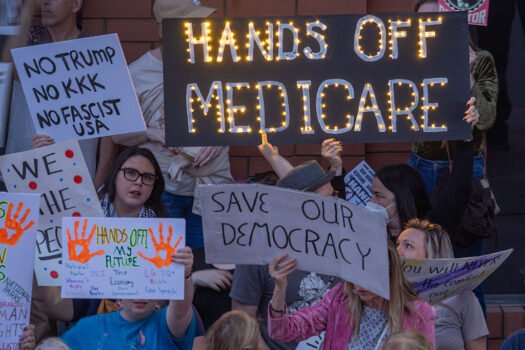By Sam Rosenthal
This article was originally published by Truthout
After caving on the shutdown and letting the GOP gut the Affordable Care Act, Democrats must chart a new health policy.
After the longest government shutdown in U.S. history, Senate Democrats faltered and ended their standoff with their Republican colleagues. Democrats had initially dug in for the funding fight, they said, to protect subsidies for the Affordable Care Act (ACA). These government tax credits, set to expire at the end of the year, keep health insurance affordable for the millions of Americans who are covered through the ACA.
In the end, the only concession Democrats extracted from Republicans was a “promise” to hold a vote on the ACA subsidies — a vote that is almost certain to fail. Ultimately, seven Democrats and one independent — Sen. Angus King (I-Maine), who caucuses with the Democrats — broke ranks with their party and voted to approve the Republican-backed budget. Why these Democrats chose to cave, and why they did so at this juncture, has mystified observers and fellow party members.
To begin with, Democrats saw some of their strongest electoral results of either Trump era on Election Night, sweeping gubernatorial contests and winning important victories across the country. There should have been a strong sense that momentum was on the party’s side. At the same time, polling showed that Democrats were winning the messaging battle over the shutdown, with more voters blaming Republicans than Democrats for the standstill. Trump’s approval rating had also fallen to the lowest point of his second term, even dipping below the lowest moments of his first term. Among the Democratic base, fighting for the ACA subsidies was popular, with more than 80 percent of Democrats backing the standoff, even as Republicans ratcheted up public pressure by ending SNAP benefits and canceling flights.
With so much seemingly working in their favor, why did Democrats abruptly cave? Sen. Jeanne Shaheen (D-New Hampshire) publicly cited a sense of intractability — that there was no clear path to ending the shutdown without one side conceding. Shaheen reportedly led a group of moderate Democratic senators who worked with Republicans to bring the standoff to an end. Meanwhile, Senator Tim Kaine of Virginia surely felt pressure from his constituents to reopen the government and end furloughs for federal workers, given that Northern Virginia is home to hundreds of thousands of federal employees.
For other Democrats, however, the rationale is far murkier. Theories abound: some observers point to a general lack of strategy within the caucus, while others blame Minority Leader Chuck Schumer (D-New York) for a failure of leadership. More partisan voices have argued that Democrats simply could not stomach watching Republicans inflict so much pain on SNAP recipients, federal workers, and the public at large. There is also speculation that some senators worried that forcing Republicans to eliminate the filibuster might have set a precedent that moderate Democrats feared could later empower their own party’s progressive flank.
In bailing Republicans out, though, Democrats have created more problems for themselves. First, outrage is growing within the party’s own ranks, taking particular aim at Schumer. This internecine discord is unlikely to die down anytime soon. And, with insurance subsidies still likely to expire for more than 20 million people in the U.S., the party now partially owns the forthcoming health care crisis. If Democrats had won real concessions from Republicans or had forced the GOP to overturn the filibuster to unilaterally reopen the government, they would have kept themselves insulated from the consequences. Instead, they now bear partial responsibility for the looming ACA catastrophe.
While the government shutdown disrupted many aspects of U.S. life, its most lasting legacy may be the harsh light it once again cast on the fragility of the U.S. health care system. It is a searing indictment of the U.S. health care system that more than 20 million people can lose coverage overnight based on the decisions of just 100 elected officials.
This moment naturally raises the question of whether Democrats are prepared to pursue more permanent and decisive action to guarantee health care for all people in the U.S. The party currently sits in the minority in Congress and does not control the White House. Yet with Trump’s favorability cratering and the 2025 election results hinting at potential Democratic gains in the midterms, the party may soon regain significant governing power. The question, then, is what Democrats would do to address the health care crisis if they were once again tasked with legislating.
In 2020 — the last competitive Democratic presidential primary — support for Medicare for All was a major issue. While proposals under that label vary, most involve establishing a single-payer national health insurance program in which the federal government covers all health care costs for everyone in the U.S.
Bernie Sanders made Medicare for All central to both his 2016 and 2020 campaigns, popularizing the idea that “health care is a human right.” At one point, as many as 10 Democratic presidential hopefuls expressed initial support for Medicare for All. Some later retreated from that stance: Kamala Harris backtracked after having supported it in the Senate, while Pete Buttigieg shifted to “Medicare for All Who Want It,” which would have left the private insurance system largely intact. Ultimately, firm support for a true Medicare for All system remained strongest on the party’s left flank, represented by Sanders and Elizabeth Warren.
If Republicans allow ACA subsidies to expire, however, health care reform is almost certain to return to the political forefront. Single-payer, universal health care bills introduced this session in both chambers of Congress have struggled to gain support from even half of their respective Democratic caucuses. Until now, though, Democrats could rely on the ACA as cover for not backing more comprehensive health care reform. But if Republicans genuinely begin dismantling Barack Obama’s signature domestic policy achievement — something they have long threatened — Democrats could suddenly find themselves without that shield. And if millions lose health care coverage heading into the 2026 midterms, Democrats may rediscover the appeal of a bold, populist policy guaranteeing universal coverage.
Still, the barriers to passing anything resembling Medicare for All remain steep. The Democratic Party is deeply divided on the issue, and with over $7 million in PAC spending from the health insurance industry during the 2024 cycle alone, that sector’s influence continues to present a formidable obstacle. Yet the collapse of the ACA subsidies — and Democrats’ complicity in that collapse — may force a reckoning. The question now is whether the party is prepared to meet the health care crisis it helped create with the sweeping solutions the moment demands.
This article was originally published by Truthout and is licensed under Creative Commons (CC BY-NC-ND 4.0). Please maintain all links and credits in accordance with our republishing guidelines.









